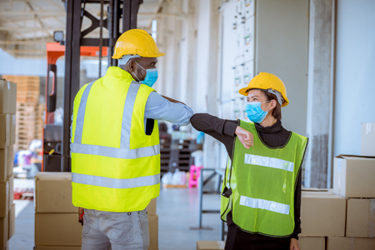Why One Biopharma Simultaneously Built Two CAR T Manufacturing Facilities On Two Separate Continents During A Pandemic

By Matthew Pillar, Editor, Bioprocess Online

Cellectis is an early clinical-stage biopharma company working on CAR T-cell and gene editing technologies to address unmet medical needs in cancer and genetic diseases. When Steve Doares left a long run at Biogen—where he most recently served as VP of Global Manufacturing Services—to join Cellectis as SVP & Site Head of US Manufacturing, he knew his work was cut out for him. The company was in the early phases of building proprietary manufacturing facilities in both Raleigh and Paris. That was the summer of 2020, and he describes progress at both facilities, at the time, as “construction sites.” What he didn’t know at the time was just how challenging it would be to spin those factories up during the peaks and valleys of a global pandemic.
Doares joined me on episode 76 of the Business of Biotech podcast to share some of the challenges Cellectis faced, and how they were overcome. Here’s a recap of one segment of our conversation. Hit that link and listen to the whole episode for all the goods.
Business of Biotech: Give us a sense of what you walked into on day one.

In fact, we were able to start our first training run, which means taking cells, thawing them, doing the editing on them, putting them through the entire process and filling them into vials. We started that on schedule (May 2021). I thought that was a remarkable accomplishment, that a building construction and commissioning validation project of this magnitude—in the pandemic environment and in the competitive environment for skilled trades—was brought online on schedule.
Business of Biotech: Why did Cellectis choose to stick those shovels in the ground and build manufacturing facilities in Paris and Raleigh?
Doares: For both Paris and Raleigh, for France and U.S. manufacturing, the company made the commitment three years ago. They wanted to take control of their destiny in terms of having control of schedules for GMP manufacturing. So Cellectis took the plunge and made the momentous decision to put the capital investment in and put spades in the ground … It's kind of the wild west in the gene therapy and cell therapy space in terms of a lot of startup companies, a lot of virtual companies all competing for the same contract manufacturing space. Even in the best relationships, negotiations with contract manufacturers, which I've had a lot of experience with before I came to Cellectis, take time. It’s difficult to schedule manufacturing slots on the fly. So, the timeline planning for moving programs from development into GMP manufacturing and getting the clinical supplies out there to support the clinical ops team, that is something that necessarily takes a long time when you have to work with a CDMO. So Cellectis took the plunge to build the manufacturing capacity internally, so that that's all within our control. And we are not making stuff for other people. We are not a CDMO. We are making stuff for our own clinical operations team. We chose to build in the U.S. because, at the first level, this is one of the many places in the world where immuno oncology clinical trials are going on. FDA has a lot of experience in these sorts of things. So, at the first level, the company made the decision that we want the drug substance and drug product manufacturing facility located in the U.S. Raleigh was a very good choice. A site up in the Northeast was being considered, as was Raleigh. The access to the stable of solid universities and colleges right here in the RTP area was a draw. The presence of these other cell and gene companies is a double-edged sword due to competition for talent, but that also means there's availability of talent – young people, young scientists, young engineers looking to further their careers. They like to go try something different. The recruiting is easier when you're in an area that has an established biotech industry going on. And frankly, considering some of the construction costs, the skilled trades are a little less expensive in this area than up in the Northeast. So those were all factors that came into decision making.
Business of Biotech: Cellectis obviously had the appetite to take on that risk. What were the company’s biggest concerns?
Doares: There's a risk calculus there. There's the time it takes to advance a product, get into your clinical trials, and take your shots on goal for having a successful product. So, part of the calculus is the fact that the clock is ticking. If you're having to spend your time with delays of months because you're working with contract manufacturing organizations, when you're a startup company, that’s one of your biggest threats. There's always the cash runway threat to a startup company. But another threat is you simply end up not being able to do anything because you can't get to clinical results on time. I think part of the risk calculus there was, it is safer and better, even though it's risky, to make these capital investments internally.
Business of Biotech: When you embrace your own manufacturing facility, you also embrace complete responsibility for everything that comes into it goes out of it, from manufacturing supplies and consumables to finished drug product. How have you rationalized that in the context of a pandemic that’s caused all sorts of trouble in the biopharmaceutical supply chain?
Doares: That’s also about taking control of your manufacturing timelines and ability to move things quickly. It is better, in Cellectis’ view, to take that stuff on internally and drive it. To your point, it means it's more than just what’s happening in the walls of the building or the walls of the manufacturing plant. There's a lot more to a manufacturing site than just the GMP manufacturing team and the QC team, which I view as sort of a different type of product being made. We make both products out of the manufacturing area, and we make testing and release data from QC. So, it's really two types of production areas, but all of those are supported by a host of other things like the supply chain organization. And we do have a supply chain organization that spans the Atlantic. We have a solid procurement team that supports us from the finance organization, and we're able to navigate some of those challenges that we face. Frankly, the pandemic did cause some hiccups across the industry, with consumables in particular. I recall we had a couple of weeks here in Raleigh when the QC lab had to stop doing some assay type work, because there were no pipette tips available. But that's when you leverage your global supply team. The people in Paris shook the trees in Europe, and in a couple of weeks, we had some more pipette tips. Remarkably, we've been able to beg, borrow, steel, and scramble to get supplies in the door, despite the challenges of the COVID pandemic. So, there must be a concerted effort among the purchasers, the supply chain team, and negotiations with vendors. You must forge close working relationships with vendors. Some of the stuff comes in just in time, and sometimes too close to just in time for my comfort level. But nonetheless, we persevered and were able to leverage this trans-Atlantic organization to pull that off.
There’s more to the story about Cellectis’ decision to build and operate dual manufacturing facilities in the face of COVID-19 disruption. A lot more. Tune in to episode 76 of the Business of Biotech for the full take.
